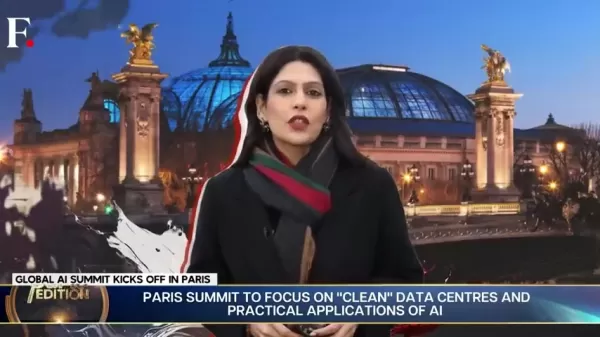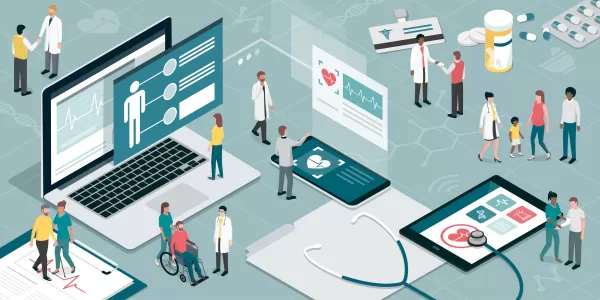Global AI Summit in Paris 2025: Shaping the Future of AI
The 2025 Global AI Summit has kicked off in the heart of Paris, gathering an impressive lineup of world leaders, tech moguls, and policymakers. Co-chaired by France and India, this summit is diving deep into the future of artificial intelligence, tackling issues like regulation, geopolitics, and real-world applications. It's all about finding a 'third way' in AI development, one that stands apart from the approaches taken by China and the US, emphasizing global collaboration and ethical innovation.
Key Highlights from the Summit
Held in the iconic Grand Palais, the summit is focusing on:
- AI Regulation: The goal is to set international standards to guide AI's development and deployment, touching on data privacy, transparency, and accountability.
- Geopolitics: Navigating the complex landscape of AI, aiming for a balanced distribution of resources and expertise worldwide.
- Practical Applications: Exploring how AI can benefit sectors like healthcare, education, and transportation, aiming to enhance life quality.
- Sustainable AI: Addressing the environmental footprint of AI, particularly the energy use of data centers, and pushing for eco-friendly solutions.
Notable Attendees and Their Roles
The summit has attracted a who's who of global figures:
- President Emmanuel Macron is pushing for a European-led AI strategy.
- Prime Minister Narendra Modi, co-chairing the event, represents India's growing AI influence.
- US Vice President JD Vance is there to discuss America's take on AI regulation and innovation.
- China's Vice Premier is showcasing the country's AI advancements.
- Tech leaders like Sundar Pichai of Google and Sam Altman of OpenAI are sharing insights into tech and ethics.
The 'Current AI' Initiative
A major announcement from the summit is the 'Current AI' project, a public-private partnership with $400 million in initial funding. It's all about making AI more accessible, fostering collaboration, and ensuring responsible innovation. Anne Bouverot, France's envoy for the AI summit, emphasized the need to move from science fiction to real-world AI applications.
Climate Concerns and Sustainable AI
Not everyone's on board, though. Climate activists are raising red flags about the high energy consumption of AI data centers, which often run on fossil fuels. They're pushing for a shift to renewable energy, advocating for what they call "clean data centers."
The Joint Statement Dilemma
There's a bit of a hiccup with the joint statement that's supposed to come out of the summit. Reports suggest the US might not sign on, mainly because much of it was drafted during the Biden administration, and Donald Trump isn't keen on it. This situation underscores the challenges of reaching a global consensus on AI governance.
AI's Real-World Impact
AI in Medicine
AI is transforming healthcare with faster, more accurate diagnostics and personalized treatment plans. It's also speeding up drug discovery, which could save lives and reduce costs.
AI in Education
In education, AI is personalizing learning experiences and helping teachers by automating administrative tasks. It's also identifying students who might need extra help, improving overall educational outcomes.
AI in Transportation
On the roads, AI is making self-driving vehicles a reality, promising safer, more efficient travel. It's also optimizing traffic flow and logistics, which could revolutionize how we move people and goods.
Weighing the Pros and Cons
The summit is a great platform for global dialogue and pushing AI innovation forward. But it's not without its challenges, from achieving international consensus to addressing ethical concerns and the environmental impact of AI.




Related article
 Google's Gemini app adds real-time AI video, Deep Research, and new features (120 chars)
Google unveiled significant Gemini AI enhancements during its I/O 2025 developer conference, expanding multimodal capabilities, introducing next-generation AI models, and strengthening ecosystem integrations across its product portfolio.Key Gemini Li
Google's Gemini app adds real-time AI video, Deep Research, and new features (120 chars)
Google unveiled significant Gemini AI enhancements during its I/O 2025 developer conference, expanding multimodal capabilities, introducing next-generation AI models, and strengthening ecosystem integrations across its product portfolio.Key Gemini Li
 Assort Health Secures $50M Funding to Automate Patient Communication
Assort Health, an emerging AI healthcare startup specializing in automated patient communications for specialty practices, has secured approximately $50 million in Series B funding at a $750 million valuation, according to sources familiar with the t
Assort Health Secures $50M Funding to Automate Patient Communication
Assort Health, an emerging AI healthcare startup specializing in automated patient communications for specialty practices, has secured approximately $50 million in Series B funding at a $750 million valuation, according to sources familiar with the t
 Generate Excel Formulas Instantly with AI-Powered Excel Tool
Transform your spreadsheet workflow with GPTExcel - the AI-powered solution that converts natural language descriptions into precise Excel and Google Sheets formulas. This powerful tool eliminates the frustration of manual formula creation, making co
Comments (3)
0/200
Generate Excel Formulas Instantly with AI-Powered Excel Tool
Transform your spreadsheet workflow with GPTExcel - the AI-powered solution that converts natural language descriptions into precise Excel and Google Sheets formulas. This powerful tool eliminates the frustration of manual formula creation, making co
Comments (3)
0/200
![JonathanMiller]() JonathanMiller
JonathanMiller
 September 25, 2025 at 12:30:41 PM EDT
September 25, 2025 at 12:30:41 PM EDT
Spannend, welche konkreten Regelungen beim Gipfel beschlossen werden! Hoffentlich wird da nicht nur geredet, sondern auch verbindliche Rahmen für KI-Entwicklung geschaffen. Besonders interessant finde ich die geopolitische Komponente - wer setzt sich eigentlich durch? 😅


 0
0
![PeterYoung]() PeterYoung
PeterYoung
 August 10, 2025 at 7:01:00 PM EDT
August 10, 2025 at 7:01:00 PM EDT
The Paris AI Summit sounds like a game-changer! Excited to see how France and India steer the convo on AI ethics. Hope they address job impacts too! 🤖


 0
0
![LarryJones]() LarryJones
LarryJones
 August 9, 2025 at 1:00:59 AM EDT
August 9, 2025 at 1:00:59 AM EDT
Super cool to see Paris hosting the AI Summit! It's wild how AI's shaping everything—kinda feels like we're in a sci-fi flick. Curious what new regulations they'll cook up! 😎


 0
0
The 2025 Global AI Summit has kicked off in the heart of Paris, gathering an impressive lineup of world leaders, tech moguls, and policymakers. Co-chaired by France and India, this summit is diving deep into the future of artificial intelligence, tackling issues like regulation, geopolitics, and real-world applications. It's all about finding a 'third way' in AI development, one that stands apart from the approaches taken by China and the US, emphasizing global collaboration and ethical innovation.
Key Highlights from the Summit
Held in the iconic Grand Palais, the summit is focusing on:
- AI Regulation: The goal is to set international standards to guide AI's development and deployment, touching on data privacy, transparency, and accountability.
- Geopolitics: Navigating the complex landscape of AI, aiming for a balanced distribution of resources and expertise worldwide.
- Practical Applications: Exploring how AI can benefit sectors like healthcare, education, and transportation, aiming to enhance life quality.
- Sustainable AI: Addressing the environmental footprint of AI, particularly the energy use of data centers, and pushing for eco-friendly solutions.
Notable Attendees and Their Roles
The summit has attracted a who's who of global figures:
- President Emmanuel Macron is pushing for a European-led AI strategy.
- Prime Minister Narendra Modi, co-chairing the event, represents India's growing AI influence.
- US Vice President JD Vance is there to discuss America's take on AI regulation and innovation.
- China's Vice Premier is showcasing the country's AI advancements.
- Tech leaders like Sundar Pichai of Google and Sam Altman of OpenAI are sharing insights into tech and ethics.
The 'Current AI' Initiative
A major announcement from the summit is the 'Current AI' project, a public-private partnership with $400 million in initial funding. It's all about making AI more accessible, fostering collaboration, and ensuring responsible innovation. Anne Bouverot, France's envoy for the AI summit, emphasized the need to move from science fiction to real-world AI applications.
Climate Concerns and Sustainable AI
Not everyone's on board, though. Climate activists are raising red flags about the high energy consumption of AI data centers, which often run on fossil fuels. They're pushing for a shift to renewable energy, advocating for what they call "clean data centers."
The Joint Statement Dilemma
There's a bit of a hiccup with the joint statement that's supposed to come out of the summit. Reports suggest the US might not sign on, mainly because much of it was drafted during the Biden administration, and Donald Trump isn't keen on it. This situation underscores the challenges of reaching a global consensus on AI governance.
AI's Real-World Impact
AI in Medicine
AI is transforming healthcare with faster, more accurate diagnostics and personalized treatment plans. It's also speeding up drug discovery, which could save lives and reduce costs.
AI in Education
In education, AI is personalizing learning experiences and helping teachers by automating administrative tasks. It's also identifying students who might need extra help, improving overall educational outcomes.
AI in Transportation
On the roads, AI is making self-driving vehicles a reality, promising safer, more efficient travel. It's also optimizing traffic flow and logistics, which could revolutionize how we move people and goods.
Weighing the Pros and Cons
The summit is a great platform for global dialogue and pushing AI innovation forward. But it's not without its challenges, from achieving international consensus to addressing ethical concerns and the environmental impact of AI.




 Assort Health Secures $50M Funding to Automate Patient Communication
Assort Health, an emerging AI healthcare startup specializing in automated patient communications for specialty practices, has secured approximately $50 million in Series B funding at a $750 million valuation, according to sources familiar with the t
Assort Health Secures $50M Funding to Automate Patient Communication
Assort Health, an emerging AI healthcare startup specializing in automated patient communications for specialty practices, has secured approximately $50 million in Series B funding at a $750 million valuation, according to sources familiar with the t
 Generate Excel Formulas Instantly with AI-Powered Excel Tool
Transform your spreadsheet workflow with GPTExcel - the AI-powered solution that converts natural language descriptions into precise Excel and Google Sheets formulas. This powerful tool eliminates the frustration of manual formula creation, making co
Generate Excel Formulas Instantly with AI-Powered Excel Tool
Transform your spreadsheet workflow with GPTExcel - the AI-powered solution that converts natural language descriptions into precise Excel and Google Sheets formulas. This powerful tool eliminates the frustration of manual formula creation, making co
 September 25, 2025 at 12:30:41 PM EDT
September 25, 2025 at 12:30:41 PM EDT
Spannend, welche konkreten Regelungen beim Gipfel beschlossen werden! Hoffentlich wird da nicht nur geredet, sondern auch verbindliche Rahmen für KI-Entwicklung geschaffen. Besonders interessant finde ich die geopolitische Komponente - wer setzt sich eigentlich durch? 😅


 0
0
 August 10, 2025 at 7:01:00 PM EDT
August 10, 2025 at 7:01:00 PM EDT
The Paris AI Summit sounds like a game-changer! Excited to see how France and India steer the convo on AI ethics. Hope they address job impacts too! 🤖


 0
0
 August 9, 2025 at 1:00:59 AM EDT
August 9, 2025 at 1:00:59 AM EDT
Super cool to see Paris hosting the AI Summit! It's wild how AI's shaping everything—kinda feels like we're in a sci-fi flick. Curious what new regulations they'll cook up! 😎


 0
0





























